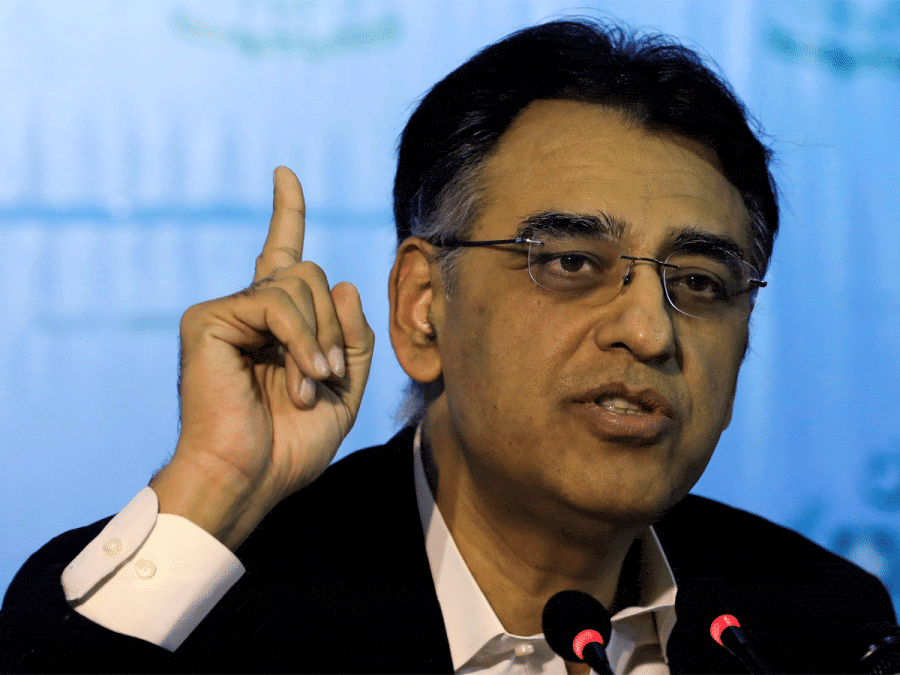Security risks have risen in Pakistan, according to Planning and Development Minister Asad Umar, due to worldwide opposition to the China-Pakistan Economic Corridor (CPEC) and the recent situation in Afghanistan.
“Security threat is elevated,” he said in response to a question at a hurriedly called news conference, adding that no doubt development on CPEC was looked upon with aversion by big global powers who wanted to sow dissension in the country. The challenges are also there because of the uncertain Afghan situation. “So there are not only security challenges, but these are at an elevated level,” he said.
Mr. Umar, on the other hand, said that the whole leadership, headed by the prime minister and including the army chief and other security high-ups, had taken successful measures that had been discussed with the Chinese leadership, which had expressed confidence in the additional security arrangements.
In such circumstances, politicians should exercise caution when commenting on CPEC, he said, adding that although criticism and recommendations are welcome, they should not be characterized as “closed down, finished, or destroyed.”
The minister was responding to remarks made lately by Salim Mandviwala, head of the Senate Standing Committee on Planning, who said that the Chinese embassy and businesses have complained about the sluggish pace of construction on CPEC projects.
The minister, without naming Mr. Mandviwala, said that he was a seasoned individual who could not be expected to talk recklessly, but that he might have been misled. He predicted that the Chinese embassy will issue a statement to the media explaining the situation.
Mr. Umar refuted claims that CPEC has slowed during the last three years, claiming that the main work on the corridor projects was finished under the current PTI government’s term.
The two main areas of emphasis in the first phase of CPEC were electricity and infrastructure, with the previous government completing 3340MW of power projects and the present government completing 5864MW. On top of that, construction on another 1824MW project began recently and will be finished when the present government’s term ends.
According to the minister, the PML-N administration built 394 kilometers of roads and highways under CPEC, while the present government has finished 413 kilometers.
He said that the PML-N administration has completely neglected the western corridor, which is crucial to CPEC. He claimed that the previous government finished the Gwadar-Hoshab road, as well as the Hakla-D.I. Khan highway, with 42 percent of the construction done, while the present government completed the remaining 56 percent. Aside from these two projects, the previous administration was unable to get any of the road projects on the western alignment beyond the preliminary approval stage.
The D.I. Khan-Zhob road (210km) project had been authorized, and a loan application had been filed, according to the planning ministry, while financing talks were ongoing. Similarly, the contractor for the Zhob-Quetta road project had been mobilized, and PC-1 of the Quetta-Khuzdar route had been authorized, despite the fact that money for this project had already been allotted in the PSDP 2021-22.
Mr. Umar claimed that the present administration had finished 67 percent of the work on the 10-kilometer Khuzda-Basima road and that the remaining work will be completed shortly. The 146-kilometer Hoshab-Awaran road project, he added, had also been authorized, and the contractor had been mobilized. The project is part of the Central Alignment of the China-Pakistan Economic Corridor (CPEC), which links the port city of Gwadar with Sindh.
“In fact, real work on the western corridor of CPEC has been started by our [PTI] government,” he said, adding that instead of waiting for the Chinese loans the government has started work on the projects from its own resources under the PSDP.
In addition, the government is beginning work on the connecting roads to the western alignment. One such project that has lately been approved is the Peshawar-D.I. Khan highway. Similarly, the 460-kilometer Karachi-Quetta-Chaman road project has been approved, with one segment to be finished by the government and the rest to be built via a public-private partnership.
Other similar projects, such as the Nokundi-Mashkel road, Mashkel-Panjgur road, and Awaran-Jhal Jhao road, have also received government approval. These linking roads and the western alignment, according to the minister, are being constructed to take full advantage of the possibilities that will open up in Afghanistan once peace and security have been established.
Asad Umar said that after completion of the first phase, “we are entering the second but very important phase of CPEC under which investment would come to a range of sectors, including industrialization, agriculture, livestock, science and technology and other social sector development sectors”. He said the present government had also taken three industrial zones to the operational stage.
Read more: https://pakobserver.net/cpec/
Read more: https://pakobserver.net/pakistan/










